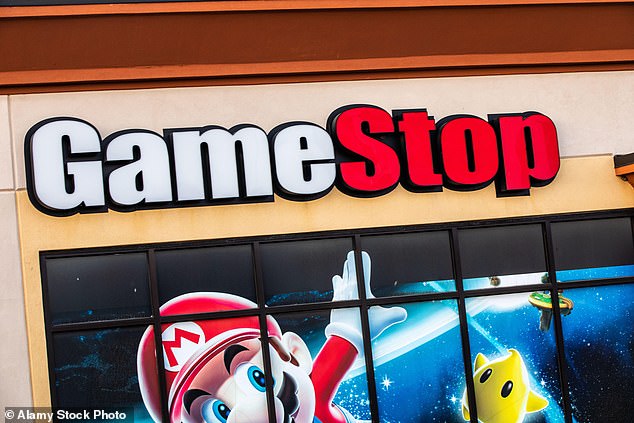Melissa Howard first heard of the American games and electronics retailer GameStop from a friend.
‘She’s really into investing and we were talking about stocks and shares last year when she mentioned this company,’ says Howard, 36.
‘She had held the shares for four years and they had recently fallen, but she was convinced it would bounce back – so I decided to invest.’
Howard opened an account with the trading platform eToro and invested £6,000 in GameStop last September. It’s been a rollercoaster ride ever since.
‘There was one day that my holding went up to £11,500 within a couple of hours. It’s a bit of a bonkers investment,’ says Howard, who runs Bidsmithery, a company that reviews bids and grants for organisations. I know it’s volatile but I’d rather have my money in this than sitting in a savings account that earns nothing.’
GameStop was the original so-called meme stock. These are shares that surge in price, propelled by social media frenzies encouraging investors to flock to buy for quick profits.
Fuelled by FOMO, aka the fear of missing out, meme stocks see their share price moved by sentiment rather than so-called fundamentals, such as the actual business case for the company or how much profit it makes.
Many investment experts have flagged that those buying meme stocks are not really investing but blindly trading to chase profits. Nonetheless, those who have managed to buy low and sell high with meme stocks have made big gains – and they have seen a surge in interest again in recent months.

Melissa Howard invested in GameStop and says it has been a bonkers and volatile ride
‘The collision between social media and financial markets was one of the most dramatic trends from the Covid lockdown,’ says Susannah Streeter, head of money and markets at wealth manager Hargreaves Lansdown. ‘Armies of retail investors realised they have the power to influence markets, and this herd-like behaviour has been continuing in spurts ever since.’
The GameStop effect
GameStop hit the headlines when it surged during the Covid pandemic, after investors started discussing the company on social media platforms, particularly the forum Reddit, and joined forces to send its price soaring. Its share price surged from around $4.42 on January 8, 2021 to a trading high of $483 by January 28, 2021.
However, meme stocks are characterised not only by their fast and often unexpected growth, but the inevitable falls that follow. A week after its 2021 peak, GameStop shares had fallen by 81 per cent.
Shares in the firm gained momentum again last year when American ‘finfluencer’ Keith Gill, writing under the pseudonym Roaring Kitty, started posting online after a three-year hiatus. Today shares trade around $22.
That’s just a fraction of the peak price, but the meme stock effect has been so strong that if you had invested £1,000 in GameStop five years ago, you would now have £19,000 – a rise of 1,800 per cent.

Shares in GameStop gained momentum last year when American ‘finfluencer’ Keith Gill, writing under the pseudonym Roaring Kitty, started posting online after a three-year hiatus. Today shares trade around $22
Bed, Bath and bankrupt
A host of meme stocks have since sparked a frenzy of interest, making some investors a small fortune, while others have lost everything. Ben Kumar, of wealth manager 7IM, says: ‘A meme stock is a company with terrible share price performance and some sort of narrative about a miracle that could save the business.
‘One extreme example was Blockbuster video in 2021, where shares rallied more than 1,000 per cent in a couple of days, even though the business has no assets or prospects.’
Many of the stocks are also those being ‘shorted’ (where investors effectively bet against a stock and so make money when it falls). Social media can be used to rally investors to buy the shares and drive the price higher, losing the short-sellers money in the process.
AMC Entertainment, a US cinema chain, was another big name in January 2021, when its share price soared 300 per cent.
The phone company Blackberry and the US retailer Bed, Bath and Beyond also found themselves part of the frenzy that year.
Shares in the former are down 25 per cent over five years, while the latter declared bankruptcy in 2023.
So hot was the trend in 2021 that one American investment firm even launched a meme stock exchange-traded fund, tracking the most popular names. It closed after less than two years having lost 47 per cent.
More recent examples include the doughnut-maker Krispy Kreme, which soared 39 per cent in one day in July, and the camera-maker GoPro, which surged 80 per cent on the same day.
‘Investors were mobilised in chat rooms and others joined in, fearful of missing out on gains,’ says Ms Streeter. ‘Firms see big spikes in value, but nostalgia alone can’t sustain the frenzy.’
Why is meme stock investing staging a comeback? Mr Kumar thinks artificial intelligence is driving the trend. ‘During Covid, people had time to trawl through Reddit forums. Now, with AI scraping the web, you don’t need to spend the time; just type in “most talked about stocks on Reddit” and it tells you.’
From meme stocks to hot stocks
Some investors choose to back companies with more substance than meme stocks but still go for shares that are in hot demand and have posted big gains.
Alex Sergent has seen the value of his portfolio soar by 72 per cent since he started investing in March. Sergent, 41, works as an adviser for technology start-up companies and wanted to invest in the stock market to help build his knowledge of his industry.

Krispy Kreme Doughnuts became a meme stock when it soared 39 per cent in one day
His preference for tech firms has led him into some of the hottest stocks of the moment.
He started by investing about £100 each in Nvidia, ASML and AMD, and added more money as they started to climb.
‘These are solid buys and they are not going to go down, in my opinion – but you can never be sure,’ says Sergent, who lives in Stratford, east London. ‘Their technologies are going to be at the centre of rapid change over the coming years, so investing in them was a no-brainer for me.’
As Sergent grew in confidence he added three more stocks to his portfolio: the trading platform Robinhood, the data analytics firm Palantir and meditech company NeuroOne Medical Technologies.
His top performer is AMD, whose share price has soared 33 per cent since he invested, while Nvidia is up by 12 per cent.
ASML shares are down 3.4pc over one year amid concerns about trade tariffs, but Sergent is confident that means it is a good time to buy.
His portfolio is up 72.5 per cent since he started investing and is now worth £10,000. ‘I look at my portfolio every morning and evening. You need to get used to the ups and downs, and if you’re of a mindset that you are scared, you shouldn’t be doing it,’ says Sergent.
The latest hot stocks are more tech-focused and, at least for some of them, there appears to be a stronger investment case than for the meme stocks promoted during Covid.
Palantir, for example, is benefiting from the artificial intelligence boom. Its shares are up 515 per cent over the past year. A member of the S&P 500, the business has a market capitalisation of $1.5bn and is also held by investment funds including Liontrust Global Innovation.
Streeter says it has stronger fundamentals than many meme stocks. The firm recently reported that quarterly revenues had topped $1 billion and it has won a multi-year contract with the US army.
However, its forward price-to-earnings ratio (a measure of a company’s value that compares the share price to annual profits) is a massive 242, compared with about 22 for the wider US stock market.
This suggests that Palantir shares may be heavily overvalued, however bright its prospects.
I moved my big crypto gain into shares
Calum Wright has bought meme stocks in the past but now tries to buy companies with more substance, while still researching forums and social media to see what people are interested in.
He is hoping his investment in electric car maker Lucid will come good.
‘It’s probably my riskiest holding but it could do well as people move away from Tesla,’ says Wright, 36, who lives in Esher, Surrey.
Wright first started investing in 2019, when he saw an investment in cryptocurrency Holocoin rise by 1,400 per cent in three days.

Ben Kumar says thanks to AI you can now just type in ‘most talked about stocks on Reddit’ and find out what’s hot
‘I sold out quickly and moved my money to Hargreaves Lansdown so I could start investing in stocks instead,’ he says. ‘People might call them meme stocks because I get some of my information from Reddit to see what people are excited about, but as I’ve learned more about investing I’ve started researching more too.’
Wright, an account director, has had mixed success with his meme stock holdings. He doubled his money in GameStop, but shares in the tech service company Fastly dropped from $75 to $5.
‘I think it’s a really promising company and it has some big institutional investors, so I’ve not lost faith,’ he says.
Other holdings include Micro Strategy and AMC, and he also holds shares in bigger names such as the Magnificent Seven tech stocks as well as the oil giant Shell. He estimates that his portfolio is up about 38 per cent since he started investing, but he has taken profits along the way.
‘I only have about a quarter of my portfolio in meme stocks, but I do believe that these volatile companies will deliver the majority of my gains,’ he says.
Beware the risk of meme stocks
Backing meme stocks is an extremely high-risk strategy and should only be done with money that you can afford to lose, as the potential for huge falls has been demonstrated repeatedly.
Kumar says: ‘I can see the appeal of meme stocks. It’s about the future and making a difference as well as making money. But my view is that you’re going to get burnt.’
Trading and timing the market is notoriously hard and most professional investors advise people not to do it. For those who would prefer to invest instead of trade, the key is to think long-term and look at a company’s fundamental value.
The key when choosing any investment is to research it thoroughly. Consider factors such as profits, sales growth, and what edge the company has over its rivals. You should be looking to invest your money for a minimum of five years, and not expect to get rich overnight.
Following social media investment trends runs the risk that you will be too late to buy and end up suffering large losses.
Investing through funds which track popular indices such as the Nasdaq or S&P 500 is one way to get exposure to some of these companies, while spreading your risk across hundreds of different stocks, which should make for a less volatile ride, says Streeter.
‘Investment decisions should be focused on a long-term plan. It’s important to ignore FOMO pressure and resist chasing after hot stocks,’ she says.












